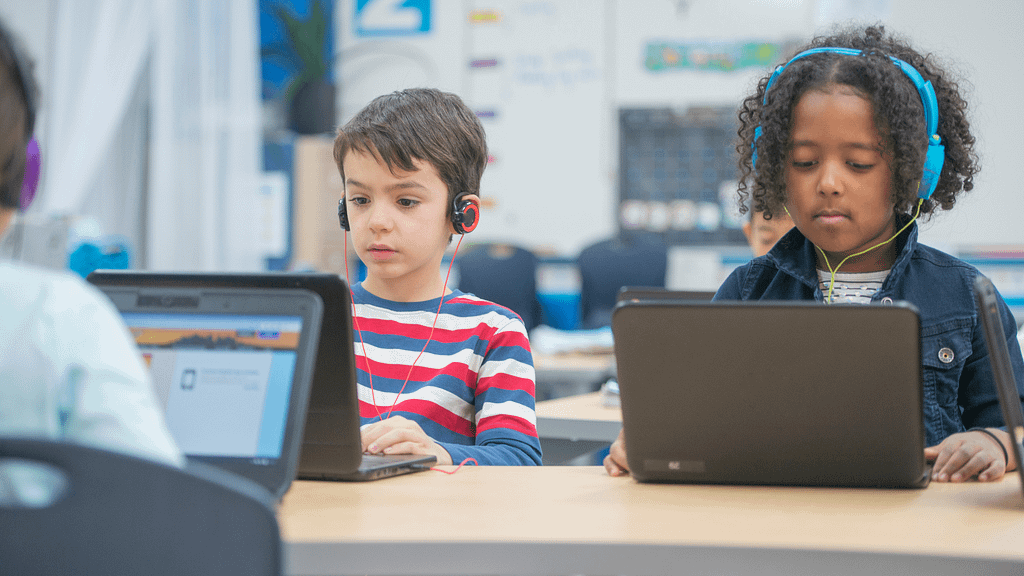There appear to be many parents asking this question at once. Teachers, on the other hand, can provide these parents with solutions. Let’s simplify that for the benefit of both sides.
Parents and educators are excited and concerned about exposing their children to electronic gadgets in a culture dominated by digital innovation and technological growth. The prevalence of technology in our daily lives raises serious concerns about how it affects the development of the next generation. This article aims to show how well-selected digital experiences can boost children’s cognitive, social, and emotional growth by exploring the educational benefits of exposing children to electronic gadgets.
As we move through the digital world, it is crucial to recognize that technology is a useful tool that, when used responsibly, may open up new avenues for learning and exploration. There is a huge potential for positive outcomes, from collaborative platforms encouraging teamwork to interactive educational apps designed to engage young brains. Acknowledging the potential benefits technology may have for a child’s development despite growing concerns about screen time and internet safety is critical.
This essay examines the cognitive benefits of actively participating in educational content, the possibility for early learning offered by electronic tools, and the development of technical literacy, which is becoming increasingly crucial in our rapidly changing society. Along with technology use’s social and emotional implications, it highlights the possibilities for collaboration, creativity, and self-expression.
By examining the educational advantages of exposing kids to digital gadgets, we hope to give parents, educators, and other caregivers a nuanced perspective. By viewing childhood and technology through this perspective, we can foster an environment where the digital world serves as a source of empowerment and enrichment for the young minds preparing to inherit our continuously changing globe.
Educational Advantage

- Improvements in Cognitive Development’s Problem-Solving Skills: One notable cognitive benefit of exposing kids to technology is that it helps them develop problem-solving skills. When using interactive and instructive programs, children are forced to think critically, evaluate situations, and make decisions, which encourages cognitive development.
- Cognitive Challenges: Cognitive challenges that necessitate problem-solving are typically presented by the games and puzzles that come with technology gadgets. These exercises aid students in developing the analytical, spatial, and strategic thinking skills that form the basis of academic success.
Early Learning Opportunities
- Educational applications: Electronic devices offer many educational applications for young children’s learning. These apps provide a fun, interactive environment that encourages young minds to learn about various subjects, such as science, language, and math.
- Digital storytelling: Interactive e-books and educational apps that employ this technique can significantly help children’s language development. Children who read stories with a technological bent develop better language abilities and love reading and storytelling.
Technological Literacy
- Digital proficiency: Children exposed to electronic gadgets at a young age are likelier to be conversant with digital tools. This early exposure lays the groundwork for computer literacy, ensuring that youngsters are secure and capable of navigating the digital world—a necessary skill in today’s tech-centric society.
- Future Planning: Exposing kids to technology today, when it is required in the workplace, helps them get ready for the workforce of the future. Early learning of digital skills prepares the stage for smoother integration into a workforce that utilizes technology for various jobs.
Growth In Social And Emotional Skills
Learning collaboratively
- Interactive Games: With good planning, technology can serve as a platform for collaborative learning. Children are motivated to cooperate when they engage in interactive games with educational objectives, fostering a sense of teamwork and cooperation. This cooperative environment helps the early development of social skills.
- Virtual Learning Environments: When kids participate in safe, supervised online learning communities, they can engage with classmates who share their interests. These digital places that promote positive interactions empower children to share their ideas, ask questions, and collaborate in a virtual educational setting.
Self-Expression And Creativity
- Digital Art: Kids can express their creativity in various ways by using the tools provided by technology-enabled toys to create digital art. Enhancing artistic skills through drawing, painting, and digital creation also allows for creativity and self-expression.
- Kids’ Coding: Early exposure to coding gives young children a creative outlet. Learning to code promotes the capacity to address issues logically and creatively. As they work on coding projects, kids feel a sense of accomplishment that builds their self-esteem and fuels their excitement for technology.
Experiences with Personalized Learning
- Technology-based educational resources can be altered to suit the preferences and requirements of each learner. Adaptive learning apps and platforms alter the content in response to a child’s development, making the educational experience engaging, demanding, and tailored to the child’s unique strengths and areas for improvement.
- Individualized Learning Pathways: Children who are allowed to follow flexible learning routes to explore their interests grow to feel independent and self-reliant. This approach enhances their academic experience and helps them develop their decision-making capacity and a sense of control over their education.
Possible Challenges May Include
Screentime management: One big concern when exposing kids to technology is the potential for too much screen time. But it’s crucial to put excellent material ahead of strict time restrictions. Ensure the information is educational, age-appropriate, and aligned with learning objectives to enjoy screen time.
Screen time may be efficiently monitored by setting up effective parental controls on devices. These controls allow parents to impose restrictions, monitor usage, and set reasonable limits, striking a balance between using technology for educational purposes and avoiding overuse.
Safe Online Environment: Constant parental monitoring is necessary to allay worries about children’s online behavior. Parents and kids should be in constant communication when teaching kids about online safety, responsible digital citizenship, and the risks of certain online interactions.
Monitoring of technology use in education is necessary. Parents and educators play a crucial role in selecting appropriate content, guiding kids through digital experiences, and ensuring that technology is used as a tool for learning rather than a source of distraction or harm.
Balancing Virtual And Real-Life Experience: Promoting a balance between virtual and real-world experiences is imperative to ease concerns about the isolation that could emerge from excessive screen use. For a more complete developmental experience, include offline activities like face-to-face interaction, arts and crafts, and outdoor play.
For technology to be integrated mindfully, it must be understood that it serves as a tool for various tasks. By introducing deliberate breaks from displays, parents and educators can create an environment where technological gadgets complement, rather than replace, a variety of learning and recreational activities.
Pioneering Tech-Excellence With ‘Tech Web Academy’
The lack of specialized technological institutions in Nigeria’s educational landscape has created a gap in digital empowerment. Nigerian students, who are enthusiastic and energetic, must navigate a system of education that has not yet completely embraced the transformative power of technology.
The lack of digital passion and abilities among students reflects a chance lost to provide the next generation with the skills they need to succeed in a world that is becoming increasingly tech-focused. A generation of Nigerian innovators prepared to negotiate the digital frontier successfully is urgently required, made possible by institutions that teach and inspire.
Bothered by this lack is a tech enthusiast, Patrick Okafor Kato (Techykato), who has an insatiable ambition and is leading an ambitious quest to start a tech revolution and build a powerful educational tech empire in the heart of Nigeria. He plans to achieve this by establishing and erecting the biggest tech academy in Nigeria, Tech Web Academy.
By skillfully fusing his love of technology with a relentless quest for excellence, Patrick Okafor Kato transcends his role as a founder to become the architect of innovation. His experience proves that tech education is more than just a set of lessons; it is a force multiplier for radical change.
Tech Web Academy is more than simply an academy; it’s Patrick Okafor Kato’s crowning achievement. It’s a place where innovation and enthusiasm converge, where students are not just educated but also motivated to design their digital futures. It inspires students not only to learn but also to fall in love with the limitless possibilities of technology.
The Tech Web Academy curriculum would be more than just a list of topics; it would be a path to technological brilliance. The traditional educational system would be intricately intertwined with various issues, such as coding, digital literacy, and developing technologies, to ensure a well-rounded learning experience.
Tech Web Academy will commit to investing in cutting-edge infrastructure to promote innovation and creativity. Modern facilities outfitted with the most cutting-edge technology will inspire students to explore, experiment, and push the limits of their ability.
People who will accompany students on their journey and teach not just information but a love for learning and a fascination for the endless possibilities of technology will be hand-selected for their dedication to technical growth.
A ray of hope for transforming Nigeria’s educational system shines in the embrace of Tech Web Academy. The academy is prepared to fill the gap by raising a generation of students with the knowledge and zeal required to lead Nigeria into a tech-driven future. The school is fervently committed to instilling technological intuition and igniting digital passion. In the heart of Nigeria, Tech Web Academy is a catalyst for a transformational educational renaissance, not merely a place to study.
Conclusion
As we navigate the intricate nexus of youth and technology, it becomes apparent that exposing kids to electronic devices has many educational benefits. In the digital age, there is no greater opportunity to use smart devices as tools for education, creativity, and societal improvement.
By examining the cognitive advantages, early learning chances, and nurturing of technological literacy, we have learned the transformative impact that well-curated digital encounters may have on a child’s intellectual development. When included in educational frameworks, these technologies serve as catalysts for the development of critical thinking, problem-solving, and other skills that are essential for the future.
Technology use’s social and emotional ramifications also highlight the potential for collaborative learning, individual expression, and individualized learning experiences. When used carefully, technology allows children a platform to interact, communicate, and explore their creative potential in previously unimaginable ways.
Worries about limiting screen time, internet safety, and striking a balance between virtual and real-world experiences highlight the importance of parents, educators, and caregivers adopting a proactive and aware approach. Implementing parental restrictions, encouraging offline activities, and encouraging open communication are essential for ensuring that technology benefits a child’s development.
And finally, the marriage of technology and childhood has enormous promise. As we embrace the educational advantages and navigate the challenges, it is crucial to approach the integration of technological gadgets from a balanced perspective.
By doing this, we prepare the younger generation for the demands of a digital world while also enabling them to use technology for lifelong learning, creativity, and meaningful connection. Thanks to technical advancements in its infancy, it is now a dynamic exploration of information, teamwork, and the seemingly limitless potential of the digital age.

